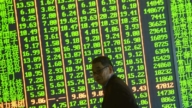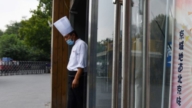【新唐人2013年06月26日訊】6月24號,中國股市滬指擊穿2000點大關,25號,A股繼續下跌,大盤上演所謂「蹦極(Bungee Jumping) 」,上證指數一度觸及1849.65點,尾盤報收1959.51點。經濟學家普遍認為,銀行的「錢荒」傳導到股市,各路資金競相撤離,投資者恐慌情緒蔓延,中國系統性的金融危機已經爆發,全面經濟危機一觸即發。
中國在最近出現,各大城市的中國銀行、和工商銀行轉賬全面暫停,而網銀、櫃檯等都無法操作,之後,股市也出現狂瀉現象。24號,上證綜合指數收盤下跌5.3%,創近四年來最大單日跌幅,跌破2000點大關,而銀行類股引領跌潮。
中國「中央財經大學」金融學院教授韓復齡向媒體公開表示, 中國系統性的金融危機已經爆發。
馬來西亞金融專家蔡偉強:「尤其中國的股市很多都是投機客,有錢荒,銀行可能潛在爆發金融危機,很多他們就會撤走,就會帶來很劇烈的跌幅。」
「北京大學」經濟學教授夏業良早在在2010年預言,中國可能在2012年至2015年間產生經濟危機。夏業良說,現在金融危機已經一觸即發,經濟危機也只是一個臨爆點的問題。
北京大學經濟學教授夏業良: 「有幾個方面的原因,一個是通貨膨脹,通貨膨脹是怎麼產生的呢﹖是因為外匯儲備,它倒逼人民幣賬款,多印鈔票,多印了多少呢﹖ 6倍以上﹗就稀釋人民幣的購買力,在國內人民幣是貶值的,在國外它是升值的,加上地方政府大量發行地方債,這個總量也差不多有20萬億,另外幾大商業銀行,特別是國有商業銀行發行各種債券、還有表外的業務,還有大量的非銀行經營資產,還有其他的一些業務,造成了實際上流動性的氾濫。」
夏業良指出,這種流動性的氾濫,使中國的經濟在一段時間裏看起來很紅火,實際上卻給中國經濟危機埋下了種子。
1988年和1994年,中國銀行曾經出現兩次「錢荒」,造成兩位數的通貨膨脹。按照慣例,當時的銀行就應該倒閉。夏業良說,當時是計劃經濟,銀行能矇混過關,最後上市前,40%的壞賬率由國有資產管理公司接過,一筆勾銷,由十幾億中國人民買單。銀行以全部優良資產上市後,在股市中圈到大量金錢,可是銀行卻以低價引進國外銀行,讓國外銀行把錢賺走。
夏業良: 「就很多外資銀行到中國的銀行持有大量的股份,而且是原始股的價錢買的,甚至還低於發行價,基本上都低於發行價,他們賺了大筆的錢,他們前一段時間在不斷的套現,所以這個情況就造成對中國老百姓很苛刻,就銀行的儲蓄和各方面的服務,對老百姓很苛刻,掙到的錢大量的奉送給了外國資本。」
「台灣大學」經濟系教授張清溪認為,目前中國大陸銀行的「錢荒」和股市大跌,顯示中國的經濟危機可能已經開始。
台灣大學經濟系教授張清溪:「經濟危機隨時都可能爆發,現在也可能在爆發,貨幣供給太多,現在就是怕繼續發行貨幣造成更不可收拾,所以造成現在這種結果。」
有評論認為,中國目前出現的信貸緊縮,是總理李克強領導的經濟團隊,在給中國銀行業做外科手術,局面仍在央行的控制之中,目地是逼迫各大銀行從泡沫中主動脫身。
夏業良:「中國經濟現在有很多的危機,金融危機是一個方面,另外它的製造業本身,經濟結構本身,它存在大量的問題,現在經濟增加速度放慢,一方面是中央政府希望它降下來這個速度,另一方面客觀條件限制它,因為出口競爭,你如果沒有創新力,沒有新的產品,只是靠原來的那種低價策略,這已經難以再維持下去了。」
美國「南卡羅萊納大學」艾肯商學院教授謝田,從去年開始已經提醒中國民眾,中國的經濟已經「硬著陸」,要看好自己的錢袋子。
採訪編輯/劉惠 後製/鍾元
Experts: Financial Crisis Has Broken Out in China
On June 24, the Shanghai Stock market fell to 2,000 points.
On June 25, A shares continue to fall.
The market staged a so-called “Bungee Jump."
The Shanghai index touched 1,849.65 points,
closing at 1,959.51 points.
Economists generally say the bank’s “money shortage"
has spread to the stock market.
Investors are in panic and are withdrawing money.
China’s systemic financial crisis has erupted,
and a comprehensive economic crisis may be imminent.
Recently, transactions, online banking and tellers for
Bank of China and ICBC in China’s large cities were temperately shut down,
followed by stock market dramatically slumped.
On June 24th, the Shanghai Composite Index fell 5.3%,
the highest single-day decline in nearly four years,
to below 2,000.
Bank stocks had the largest decline.
Han Fuling, professor at China’s Central University
of Finance and Economics openly told the media that
China’s systemic financial crisis has erupted.
Malaysian financial expert Cai Weiqiang: “In particular
there are many speculators in China’s stock market.
With money shortage, financial crisis could potentially erupt.
Many will withdraw capital and cause severe decline."
Beijing University professor of Economics Xia Yeliang
predicted as early as 2010 that
China might have economic crisis between 2012-2015.
Xia Yeliang said the financial crisis is now imminent,
and the economic crisis is also about to explode.
Professor Xia Yeliang: “There are several reasons for this.
One is inflation. How does inflation happen?
Foreign exchange reserves pressure of overprinting RMB bills.
How much more was printed? Over six times more!
This leads to dilution of the purchasing power of RMB.
As RMB currency devalues in China, overseas it appreciates.
Also, local governments issuing large amounts of bonds,
totaling up to nearly 20 trillion yuan,
large commercial banks, especially state-owned issuing bonds,
a variety of off-balance sheet business, non-banking assets,
as well as some other business, all result in excess liquidity."
Xia Yeliang pointed out that this kind of excess liquidity
makes China’s economy looks very prosperous for some time.
In fact, it sowed the seeds of economic crisis.
In 1988 and 1994, Bank of China had two
“money shortages," and caused double-digit inflation.
The bank should have gone bankrupt.
Xia Yeliang says the planned economy at that time
helped banks to muddle through.
Before it went to the stock market, 40% of the bad debt
was taken over by state-owned asset management,
written off and paid for by the millions of Chinese people.
The banks were listed with all good assets
and get lots of money from the stock market.
But the bank, introduced foreign banks at a low price,
allowing foreign banks to make money.
Xia Ye Liang: “Many foreign banks hold
a large amount of banks stocks in China.
They purchased it at the original price, even lower
than the IPO price, and they earned lots of money.
A while ago, they kept cashing in the money.
This is very harsh for the China’s people.
Bank saving and service conditions are harsh to Chinese people.
Their hard earned money was given to foreign capital."
Professor of Economics Zhang Qingxi at National Taiwan
University believes the “money shortage"
and the stock market crash in China show that
China’s economic crisis may have begun.
Zhang Qingxi: “Economic crisis could erupt at any time.
Too much money was supplied.
Right now there is the fear that
continuing to issue money might be unmanageable.”
Commentators believe the current credit crunch is because
Premier Li Keqiang giving China’s banking system surgery.
Chinese central government is still controlling the situation,
forcing major banks to take the initiative to get away from the bubble.
Xia Ye Liang: “China’s economy has many crises.
The financial crisis is one aspect.
Additionally, its manufacturing sector and
economic structure have lots of problems.
Regarding the current slow down, on one hand,
the central government hopes to slow it down;
on the other hand, it’s due to objective conditions.
Without innovation or low-priced products,
the original low-cost strategy is hard to
maintain export competitiveness.”
University of South Carolina Aiken Business School
professor Xie Tian reminded people since last year that
China’s economy has ‘landed hard,’
and people need to watch their wallets.




























